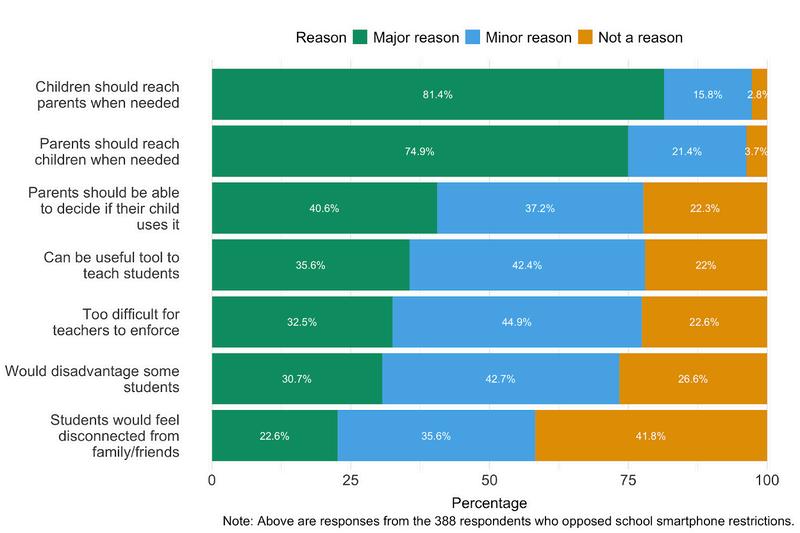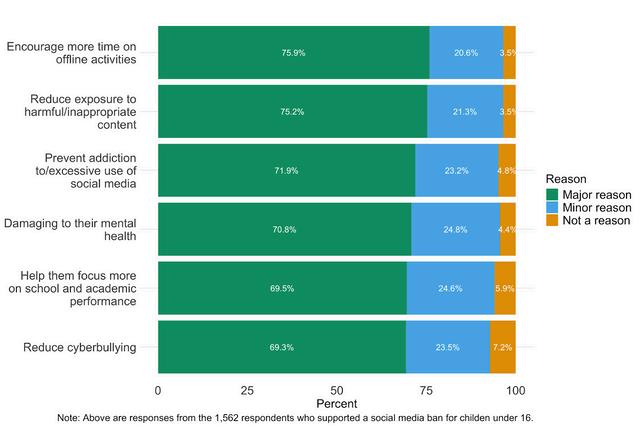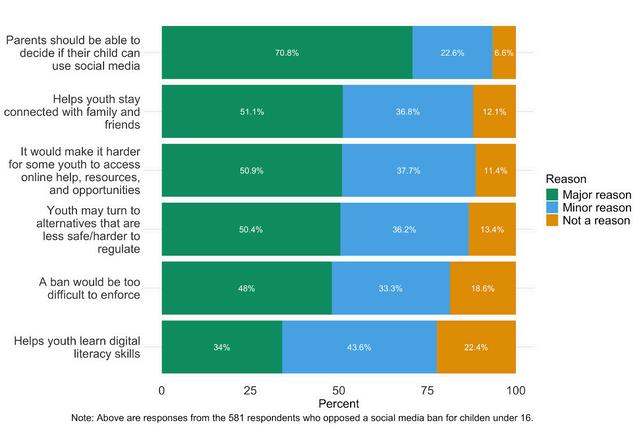Californians Call For More Tech Regulations For Children











Young people spend much of their time in digital spaces not designed for them. There is growing recognition of the need for stronger safeguards to support their well-being. As policymakers consider new regulations, such as smartphone restrictions in schools or age minimums for social media use, it is important to understand how different stakeholders, including parents of school-aged children who will have to deal with these new policies daily, view these regulatory solutions
To help fill this gap, we fielded a poll of 2,143 adults across the state of California, including 870 parents and guardians of children under 18 asking them how they feel about a variety of technologies youth use everyday. Our results offer an initial look at how Californians view proposed regulations for children's access and use of digital technologies.
Almost all Californians support stricter regulations on children’s use of digital technology, including smartphones, generative AI, and social media, citing concerns about school distractions and children’s mental health and safety Although support somewhat varies by parental status, education, and income level, there is broad agreement across groups in favor of stronger oversight. When it comes to social media, a majority of Californians favor restricting access for children under 16, though many are unclear about which platforms such a ban would actually affect. When it comes to artificial intelligence, most Californians support the use of generative AI in schools if clear guardrails are in place However, they do not yet trust anyone, including local or federal government, educational systems, or technology companies to set and enforce them
An overwhelming majority of Californians support restricting children's smartphone use during school hours.
Eighty-two percent of California adults supported the Phone-Free Schools Act, which requires California public schools to adopt policies restricting or banning student smartphone use during school hours by July 1, 2026
There was bipartisan support for these restrictions, with 84% of Republicans, 81% of Democrats, and 80% of Independents or those with other affiliations supporting the policy.


However, support varied by parental status, education, and income. Those who were parents of minors were less supportive of school smartphone restrictions (74%) than those who were not (87%) Support also increased with education, from 71% among adults with a high school diploma or less to 81% among those with some college or an associate’s degree, and 85% among those with a bachelor’s degree or higher. A similar pattern was evident for income, with 84% of higher-income adults in favor of school smartphone restrictions compared to 78% of lower-income adults
Do you support or oppose the new law requiring California public schools to create a policy banning or restricting student smartphone use during school hours?


Supporters of school smartphone restrictions cite fewer distractions for students; those opposing restrictions want to keep lines of communication open between children and parents.
The top reason Californians supported restricting smartphone use in schools was to reduce student distractions (88%), followed by concerns about excessive smartphone use (77%), improving students’ social skills (75%) and mental health (70%), and reducing cheating (60%). Fewer adults saw bullying prevention as a major reason for smartphone restrictions at school (46%)
Among those who opposed smartphone restrictions, the top concerns were making sure children could reach their parents (81%) and that parents could reach their children (75%). Other reasons, such as difficulties enforcing the rules or potential disadvantages for some students, were cited less often (less than 41%)

Adults across education levels, income groups, political affiliations, and parental status tended to cite similar reasons for supporting or opposing school smartphone restrictions.
Please rate each statement as a major reason, minor reason, or not a reason why you SUPPORT restrictions on smartphone use at school.

Please rate each statement as a major reason, minor reason, or not a reason why you OPPOSE restrictions on smartphone use at school.

Most Californians support the use of generative AI in schools, but with clear guardrails.
Sixty-one percent of California adults support allowing generative AI in schools, with limits and oversight. Thirty-one percent favored restricting AI use mostly to teachers or administrators, with limited and closely supervised use by students Another 30% supported making AI widely available to teachers and students, provided clear guidelines and supervision are in place A smaller number (19%) opposed the use of generative AI in schools altogether, while 12% favored its full integration with few restrictions for teachers or students. Another 8% were unsure or neutral.
Those who were parents of minors were more likely to support the full integration of AI in school with minimal restrictions (20% vs 6%) and less likely to oppose the use of generative AI in schools (13% vs 24%) than those without minors at home There were no substantial differences in support for school use of generative AI based on education level, income, or political affiliation.

To what extent do you support the use of generative AI in schools? Some examples of generative AI you may have heard of are ChatGPT, Claude, Gemini, and Copilot.

Do not support – Generative AI should not be used in schools due to its risks
Limited support – Generative AI should primarily support teachers or admin tasks; student use should be minimal and closely supervised
Support with guidelines – Generative AI should be widely available to teachers and students, but used with clear rules and supervision
Strongly support – Generative AI should be fully integrated into schools for both students and teachers, with few restrictions
Neutral – I don't have a strong opinion
Unsure – I need more information before forming an opinion
A majority of Californians support a social media ban for children under 16.
More than 70% of Californians supported banning social media for children younger than 16. Levels of support did not significantly differ based on parental status, education level, income, or political affiliation.

This should read: Would you support or oppose a ban that prohibits children **under 16 years of age** from using social media?

Supporters of social media bans cite youth safety and well-being, while opponents believe the decision should be up to parents.
Supporters of a social media ban for children under 16 cited several key reasons for their support: encouraging more offline activities (76%), reducing exposure to harmful or inappropriate content (75%), preventing addiction or excessive use (72%), addressing mental health risks (71%), improving academic focus (69%), and reducing cyberbullying (69%).
Most opponents (71%) reported that parents should decide whether their child uses social media Other reasons for opposition included the role of social media in helping youth maintain social connections and develop digital literacy skills, and concerns about the challenges of enforcing a ban and the potential for a ban to disadvantage some youth (cited by 34% to 51%)
Those who were parents of minors showed differences in their reasons for supporting or opposing social media restrictions compared to those who were not, even when controlling for age Fewer adults who were parenting versus not parenting minors cited preventing excessive social media use (72% vs. 83%) and encouraging more offline activities (76% vs. 81%) as major reasons for supporting social media bans.
Those parenting minors were more likely to oppose bans due to social media’s ability to facilitate social connections (59% vs. 46%) and digital literacy skills (44% vs. 25%) compared to those not parenting minors, and had more concerns about limiting youths’ access to online resources and opportunities (57% vs 46%)

Please rate each statement as a major reason, minor reason, or not a reason why you SUPPORT a ban on social media for children under 16 years of age?

Please rate each statement as a major reason, minor reason, or not a reason why you OPPOSE a ban on social media for children under 16 years of age?

Many Californians support social media bans, yet many may not fully realize which platforms a social media ban would affect.
Social media are digital platforms that allow people to communicate, interact, and share content within online communities. Californians were shown a list of platforms fitting this definition Most recognized Facebook, Instagram, X (Twitter), and Snapchat as social media (68-89%) Far fewer identified YouTube (54%), Reddit (38%), or Discord (29%) as social media, indicating that many Californians are in favor of bans but may not fully realize which platforms a social media ban would affect.
Which of the following platforms would you consider to be “social media”?

Most Californians support stricter tech regulations for children, but – at least in the case of AI– few trust anyone to regulate it.
Almost all Californians favored stricter regulations on smartphones, social media, and AI for children. However, when it came to AI, fewer than half of adults reported moderate to complete trust in local, state, or federal government, or in Big Tech companies, to make decisions about children and AI.
How much do you trust the following groups to make decisions about children and AI?

Californians broadly support stronger restrictions on children’s digital technology use, including school-based restrictions on smartphones and generative AI, and broader restrictions on social media for children under 16 Support is largely driven by concerns about classroom distractions, youth health and wellbeing, and excessive use.
Yet, there is confusion over what platforms a social media ban would cover: nearly half of Californians did not consider YouTube social media, despite it being the most widely used social media platform among youth. This disconnect raises important questions about how a ban would be understood or enforced.

Trust in anyone to regulate digital technology for children is also low. Fewer than half of Californians expressed trust in local, state, or federal government, or in Big Tech companies, to make decisions about children and AI.
In principle many people are in favor of AI regulation. However, in practice it may be difficult to find a trusted broker to lead regulatory efforts. Effective regulation of digital technology for children will require not only clearer communication and transparency, but also trusted institutions to lead these efforts

2,143 Californian adults completed the survey online.
Data were collected using a hybrid sampling approach that blended a probability sample from the California voter file (n = 478) with a non-probability sample from a large online panel administered by Dynata (n = 1,665). Parents and guardians of children ages 0 through 17 (n = 870) were oversampled
Participants shared their views on regulations related to smartphones, generative AI, and social media use among children
Data were collected by TrueDot between May 27 and June 2, 2025.
Contact: Nancy Lê, nancybl@uci.edu, (949) 824-4592
Media contact Mimi Ko Cruz
mkcruz@uciedu 949-824-1278

Sponsorship contact Stacy Skwarlo
sskwarlo@uciedu 949-824-0383
